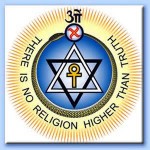Freedom of Thought
By Dorothy Abbenhouse
Dorothy Abbenhouse served as president of the Theosophical Society in America from 1987-1993.
This article appeared in her Viewpoint column in the Fall 1987 issue of The American Theosophist.
The Freedom of Thought resolution adopted by the General Council of the Theo-sophical Society (Adyar) a half century ago is very clear: Members of the Society are free to think, to believe, to work for any truth they find valid; at the same time each must respect the freedom of all other members to find their own truths.
This statement is both the strength and weakness of this Society. It allows utmost freedom to the members, which permits the expression of nonsense as well as wisdom. It allows the greatest opportunity for members to find within their own nature the ethical systems, the basic statements that express their own experience of truth.
The resolution states that the sole condition of membership in the Society is “approval of its three Objects” and that “No teacher, or writer, from H. P. Blavatsky downwards, has any authority to impose his teachings or opinions on members. Every member has an equal right to attach himself to any school of thought which he may choose, but has no right to force his choice on any other.”
Visiting with groups, I have found that whenever this question of freedom of thought is introduced, beliefs of every kind are expressed. The widest variety of systems of thought, practices, and teachers are offered. There is very little agreement as to doctrine, and often a cry for specific direction.
The Ancient Wisdom, through history, has given us a doctrine broad enough to include everything, but emphasizing a sense of order, relationship, wholeness that can be tested in daily living by every seeker.
The bond of union represents our common search and aspiration for truth: “Truth should be sought by study, by reflection, by purity of life, by devotion to high ideals . . . Truth [is] a prize to be striven for, not . . . a dogma to be imposed by authority” and “belief should be the result of individual study or intuition.”
“Everyone willing to study, to be tolerant, to aim high, and to work perseveringly, is welcomed as a member, and it rests with the member to become a true Theosophist.”
The assumption behind freedom of thought is that the eternal truths will be found through study and work on behalf of the wisdom that is at the center of every religious tradition.
